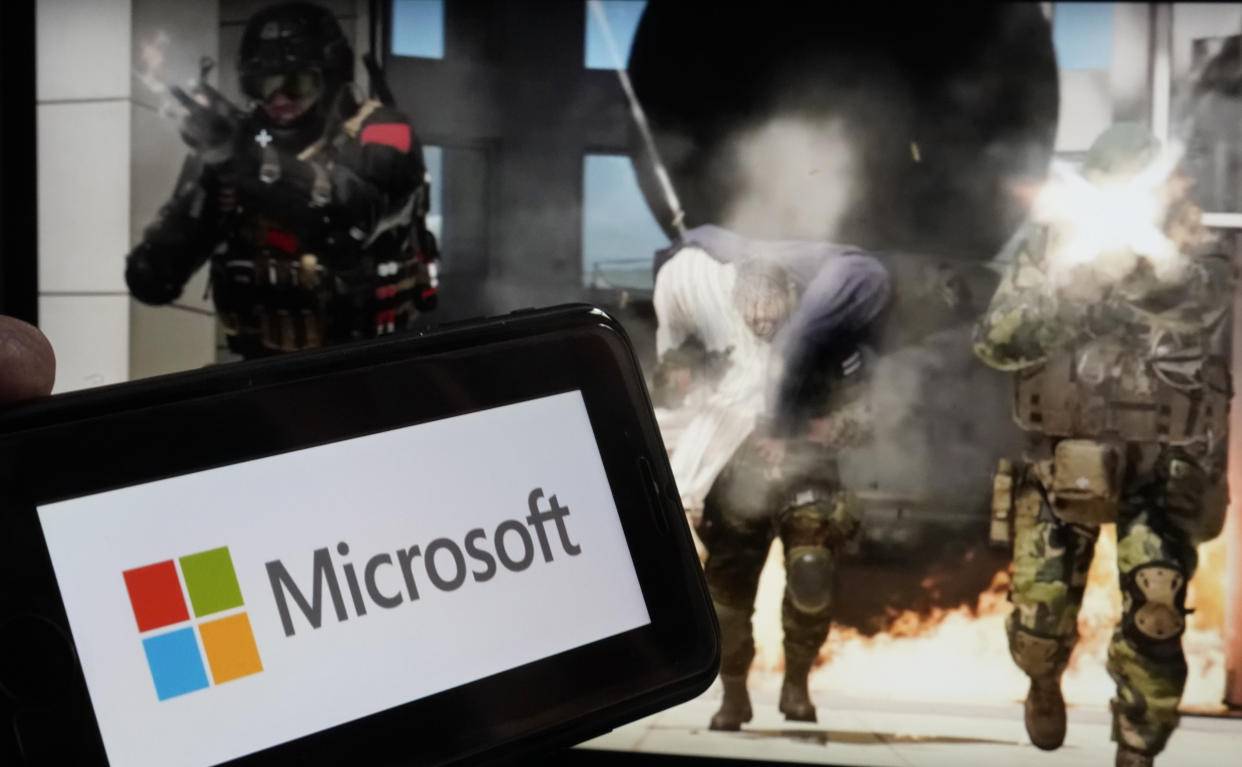Judge says Microsoft-Activision deal can proceed, Activision Blizzard stock soars 11%
Microsoft's (MSFT) $69 billion acquisition of "Call of Duty" maker Activision Blizzard (ATVI) got a major boost on Tuesday. A federal court declined to grant the Federal Trade Commission a temporary restraining order that would have kept Microsoft from closing the transaction on July 18.
However, the deal still faces an FTC antitrust lawsuit, which alleges that the purchase would harm competition in the gaming space. But by winning in federal court, Microsoft finds itself one step closer to completing the tie-up.
Activision Blizzard stock jumped 11% on the news. Shares of Microsoft were flat.
"We are disappointed in this outcome given the clear threat this merger poses to open competition in cloud gaming, subscription services, and consoles," FTC spokesperson Douglas Farrar said in a statement. "In the coming days we'll be announcing our next step to continue our fight to preserve competition and protect consumers."
In seeking the restraining order, the FTC argued that allowing Microsoft to move forward would give the company the ability to cut off rival Sony from the "Call of Duty" franchise and gain a massive lead in the still nascent cloud gaming market. US District Judge Jaqueline Scott Corley, however, disagreed with that assertion.
"The FTC has not shown it is likely to succeed on its assertion the combined firm will probably pull Call of Duty from Sony PlayStation, or that its ownership of Activision content will substantially lessen competition in the video game library subscription and cloud gaming markets," Scott Corley wrote in her decision.
Harold Furchtgott-Roth, a former commissioner of the Federal Communications Commission, says where the deal goes from here likely depends on negotiations between Microsoft and the FTC. That's because although the district court's order weakens the FTC's antitrust claims, the FTC can continue to pursue those challenges even if Microsoft and Activision close.
In Microsoft's favor, he said, is that in recent years the Supreme Court has put less weight on decisions made by administrative law judges (ALJ), the type that the FTC chose to challenge the major merger. The decisions are considered advisory and not final and subject to review by the DOJ or full FTC.
"To assign that to an ALJ — that's very odd," he said. "There's not a lot of precedent for this. Usually, the ALJ gets involved in other issues, but not in mergers."

"I think it was intended initially to run out the clock on Microsoft," he added, saying a decision could take months or even years because no deadlines are imposed on the FTC's reviews.
However, the possibility of a DOJ or full FTC post-close antitrust challenge means that the FTC is likely to ask the tech giant for concessions.
"The flip side is Lena Khan is a very aggressive Chair of the FTC," Furchtgott-Roth said. "Love or hate her, she has a very clear vision of the role of the chair of the FTC, and that vision is a very aggressive, ambitious one, and she's taking every step possible to make that vision become a reality."
In a statement, Microsoft President Brad Smith said he hopes the judge's ruling will push other jurisdictions to move forward with approving the deal.
"As we’ve demonstrated consistently throughout this process, we are committed to working creatively and collaboratively to address regulatory concerns," he said.
Activision Blizzard CEO Bobby Kotick, meanwhile, said the deal will benefit consumers and workers.
"It will enable competition rather than allow entrenched market leaders to continue to dominate our rapidly growing industry," said Kotick.
'Call of Duty'
The key to the deal is Activision Blizzard's lucrative "Call of Duty" franchise. The game series earns Activision Blizzard billions each year, with the latest installment, 2022's "Call of Duty: Modern Warfare II," clearing $1 billion in sales in its first 10 days on the market.
Global regulators including those in the EU, Brazil, China, Japan, and South Korea have already approved the deal, while the UK's Competition and Markets Authority (CMA) blocked the acquisition saying that it threatens to “alter the future of the fast-growing cloud gaming market.” The CMA said it was concerned that Microsoft would box out competition in cloud gaming, which could lead to “reduced innovation and less choice for UK gamers over the years to come." Microsoft is appealing that decision.
As for the FTC, its regulators say that Microsoft's ownership of Activision Blizzard "would enable Microsoft to suppress competitors to its Xbox gaming consoles and its rapidly growing subscription content and cloud-gaming business." Those competitors include Sony's PlayStation, Nintendo's Switch, and Nvidia.
To assuage regulators' concerns that Microsoft would abuse the deal to wall off "Call of Duty" from its rivals, the company has signed agreements with the likes of Nintendo and Nvidia ensuring the game is available on their platforms for at least 10 years. Nvidia initially objected to the deal but gave its own approval after reaching the deal with Microsoft.
It's important to note that "Call of Duty" isn't currently available for Nintendo's Switch, and likely would require significant reworking to run on the relatively underpowered console.
In one of the hearings to settle the FTC's request for a restraining order, a 2022 email from PlayStation chief Jim Ryan showed his views on Microsoft's Activision deal. "It’s not an Xbox exclusivity play at all," Ryan wrote. "I’m pretty sure we will continue to see COD on PS for many years to come."
Got a tip? Email Daniel Howley at dhowley@yahoofinance.com. Follow him on Twitter at @DanielHowley.
Alexis Keenan is a legal reporter for Yahoo Finance. Follow Alexis on Twitter @alexiskweed.
Follow Yahoo Finance on Twitter, Facebook, Instagram, Flipboard, SmartNews, LinkedIn, YouTube, and reddit.
